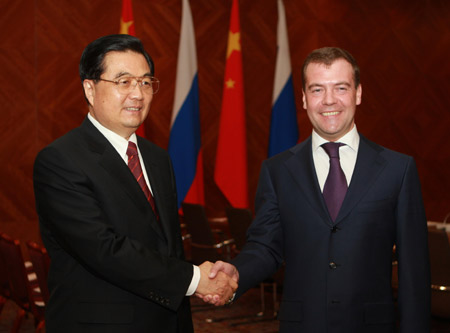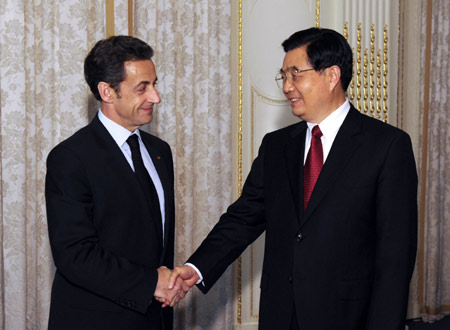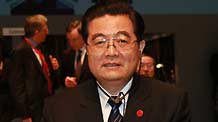Hu's Proposals Play Important, Constructive Role at G20 Summit
Adjust font size:
 |
|
Chinese President Hu Jintao (L) meets with Russian President Dmitry Medvedev in London, Britain, on April 1, 2009. [Xinhua]
|
 |
|
Chinese President Hu Jintao (R) shakes hands with French President Nicolas Sarkozy during their meeting in London, Britain, on April 1, 2009. [Xinhua]
|
Chinese President Hu Jintao made concrete proposals on tackling the global financial crisis at the G20 London summit, playing an important and constructive role for the summit to gain pragmatic results, the Chinese foreign minister said on Friday.
"The summit produced measures of high value in fighting the financial crisis and built up confidence for the world to tide over the crisis and renew economic growth," Yang Jiechi said, adding that Hu's proposals contributed to the result.
The international community held high expectations, especially on influential emerging economies such as China, and President Hu's attendance caught much attention, Yang said.
At the summit, Hu called for international cooperation, actively participated in various discussions, comprehensively introduced China's effective measures in dealing with the financial crisis, Yang said.
According to Yang, the Chinese president's trip was proved to a success mainly in five aspects.
Firstly, Hu expounded China's opinions on the global financial crisis and called for coordination and support between each other to "join hands and tide over the difficulties together."
Hu reiterated the Chinese government's willingness to strengthen macroeconomic policy coordination with the international community, push the reform of the international financial system forward, actively safeguard the stability of the multilateral trade mechanism and contribute to the restoration of the world's economic development.
Secondly, Hu put forward proposals on reforming the international financial system, saying efforts should be made to strengthen cooperation in financial regulations, formulate as soon as possible widely accepted standards and norms of the regulations, Yang said.
International financial institutions should offer more aid to developing countries and the Financial Stability Forum should playa bigger role, the Chinese president said.
The International Monetary Fund (IMF) should strengthen and improve its supervision over the macroeconomic policies of various economies, major reserve currency issuing economies in particular, with a special focus on their currency issuing policies.
Measures should be taken to improve the governance structures of the IMF and the World Bank and give more say to developing countries.
Thirdly, Hu introduced to world leaders China's anti-crisis measures and preliminary achievements gained in tackling the economic downturn.
Fourthly, China voiced strong opposition to protectionism and concerns over development issues, Yang said.
Hu pointed out that protectionism had produced grave consequences, lessons of history must be learnt, and no country should resort to protectionism under the excuse of stimulating the economy.
Yang said the crisis has taken its toll particularly on the developing nations and the UN Millennium Goals have also suffered as a result.
China, as the world's biggest developing nation, has spared no efforts in defending the interests of developing nations, the minister said.
Fifthly, Hu's visit promotes bilateral relations with some countries, Yang said.
In London, Hu held talks with his US counterpart Barack Obama in the first meeting between the two heads of state since the new US administration took office in January, agreeing to build a positive, cooperative and comprehensive relationship in the 21st century and establish a new "China-US Strategic and Economic Dialogue" mechanism.
The meeting ushered in a new era which features healthy and stable development of China-US relations, Yang said.
In a meeting between Hu and his Russian counterpart Dmitry Medvedev, the two leaders agreed to push forward bilateral ties, jointly tackle the global financial crisis and strengthen coordination in dealing with international affairs.
When meeting with British Prime Minister Gordon Brown, Hu reached broad consensus with him on tackling the international financial crisis, promoting the reform of the world financial system and enhancing bilateral relations.
Hu also met with his French counterpart Nicolas Sarkozy, Japanese Prime Minister Taro Aso, Brazilian President Luiz Inacio Lula da Silva, Australian Prime Minister Kevin Rudd, and South Korean President Lee Myung-bak.
Despite a tight schedule, Hu tried to seize every opportunity to explain China's positions and views on various issues and achieved good results, Yang said.
G20 groups the world's major economies and serves as a key and effective platform for tackling the current global economic and financial challenges, Yang said.
China is ready to work with other G20 members to implement the consensus reached at the London summit and make greater contributions to overcoming the financial crisis, renewing global economic growth and advancing international financial reforms, the minister concluded.
(Xinhua News Agency April 4, 2009)
